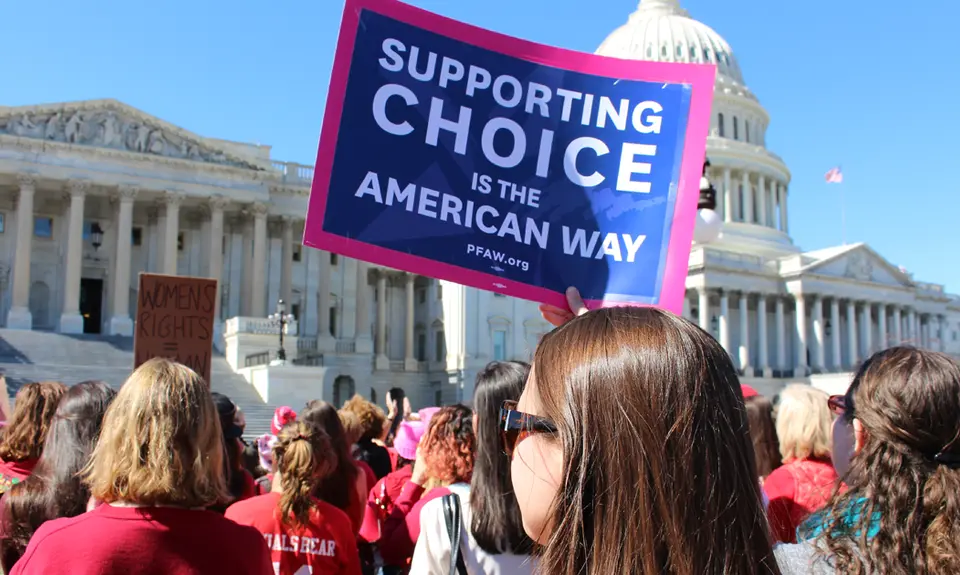“Confirmed Judges, Confirmed Fears” is a blog series documenting the harmful impact of President Trump’s judges on Americans’ rights and liberties. Cases in the series can be found by issue and by judge at this link
Trump Eighth Circuit judge David Stras argued in dissent that the court should vacate a preliminary injunction against a restrictive Missouri abortion law that prohibits abortions because of possible Downs Syndrome. The panel majority, including a judge nominated by President Reagan, rejected that view and upheld the injunction in its June 2021 decision in Reproductive Health Services v Parson.
In 2019, Missouri passed a bill that severely restricted abortion in two ways. It banned all abortions conducted after eight weeks of pregnancy, and it banned all abortions where a provider knows that a woman is seeking an abortion “solely” because of a diagnosis or the “potential” of Downs Syndrome. Reproductive Health Services of Planned Parenthood (RHS), which provides reproductive health care in the St. Louis area, challenged these provisions as unconstitutional on behalf of itself and its physicians, other staff, and patients. A district court issued a preliminary injunction against the law taking effect while the litigation is pending, and the state appealed to the Eighth Circuit.
All three judges on the panel affirmed the injunction against the eight-week ban, and Judge Jane Kelly, joined by Reagan nominee Judge Roger Wollman, also upheld the injunction concerning the Downs Syndrome ban. The majority specifically found that RHS is “likely to succeed on the merits of its challenge” to the Downs Syndrome provision, in accord with an earlier Eighth Circuit decision that enjoined a similar ban in Arkansas, and that the district court had properly found that the ban posed a “threat of irreparable harm.”
Trump judge David Stras dissented and argued that the court should have vacated the injunction against the Downs Syndrome provision. He asserted that RHS had failed to show a “threat of irreparable harm” from that ban because its claims rested on a mere “speculative risk of sanctions” against doctors who perform abortions where Downs Syndrome could be a factor in a woman’s decision. In addition, Stras argued that there is “reason to doubt” whether the court’s previous decision in the Arkansas case concerning a similar law was “correctly decided,” and argued that the Missouri law was simply a “regulation” and not a “ban” on abortions, although even he conceded that the panel “has to follow” the decision in the Arkansas case.
The majority explained what was wrong with Stras’ arguments. The Downs Syndrome provision does not simply “set a condition” that, once complied with, makes a pre-viability abortion permissible, which the majority noted is what a “regulation:” does. Instead, they went on, it “would prevent certain patients from getting a pre-viability abortion at all,” which makes it a “ban, not a regulation.” As to irreparable harm, the majority wrote, RHS had met the standard of demonstrating that such harm would be “likely in the absence of an injunction.” Rather than relying on a “speculative risk” as Stras charged, the majority continued, the district court made a “factual finding” that the provision would “likely be enforced” against RHS when the provider knows or has a “strong suspicion” of a Downs Syndrome diagnosis, so that RHS would be unable to provide abortions to such patients “due to a real threat of prosecution.” Although Stras may have “weighed the evidence differently,” the majority noted, “that is not enough” to overrule the district court’s finding of a “likelihood of irreparable harm” without an injnnction.
The future of this case and this issue remains unclear. At least for now, however, Missouri’s restrictive ban on some abortions will not go into effect. Reproductive rights are also jeopardized by a Supreme Court, with three Trump justices, that has agreed to consider a restrictive Mississippi ban on abortion next Term. For the sake of our fight for our courts, it is crucial that the Senate promptly confirm Biden nominees to the federal courts at all levels in order to help uphold all of our rights, including the right to reproductive freedom.
